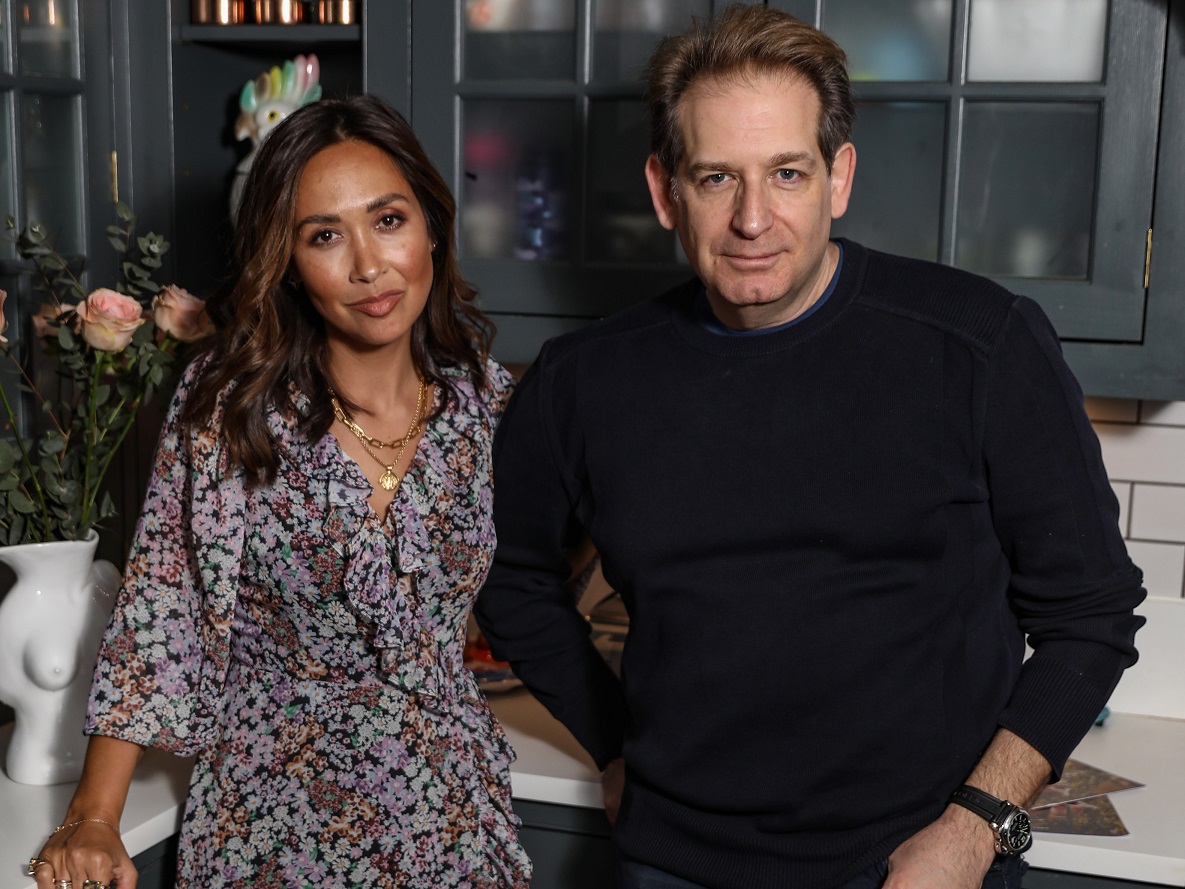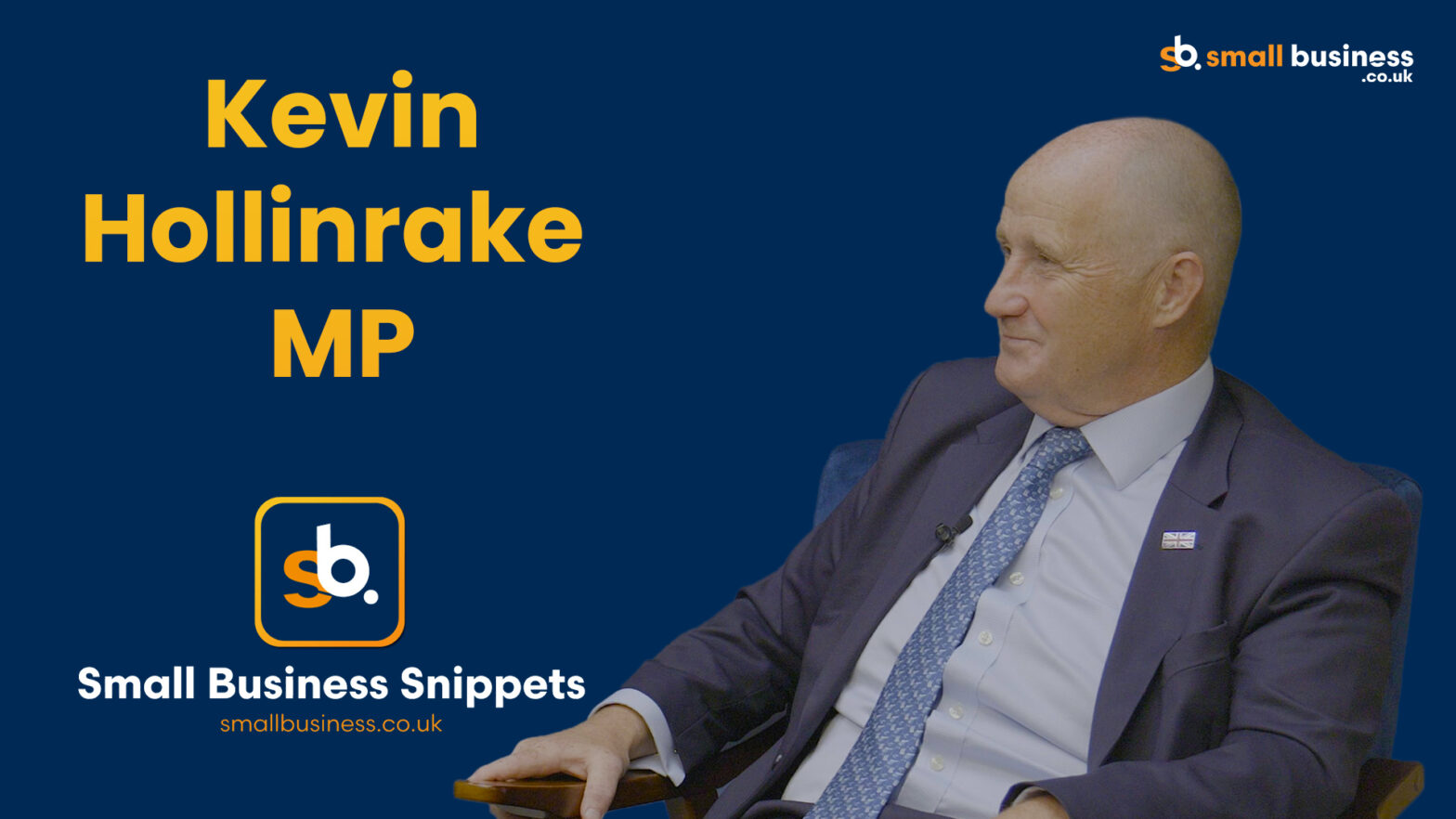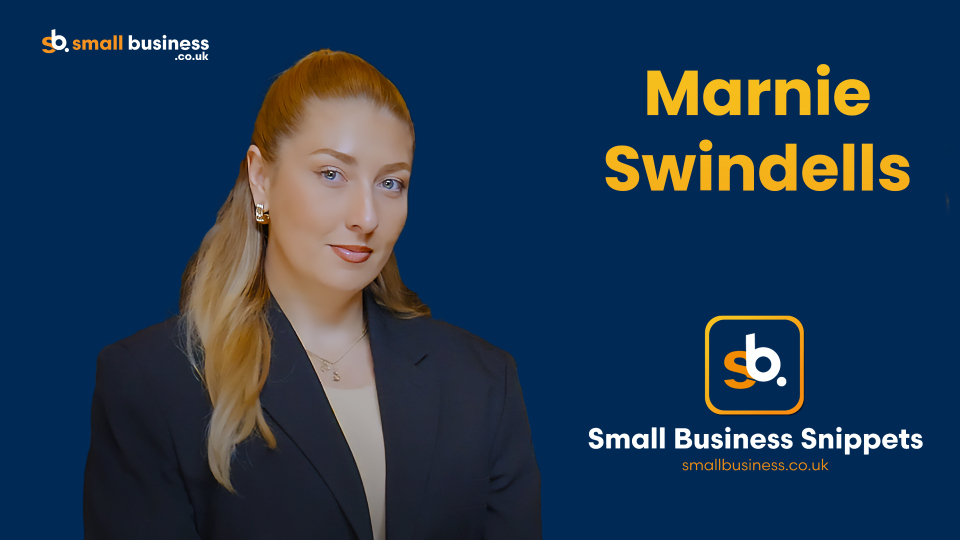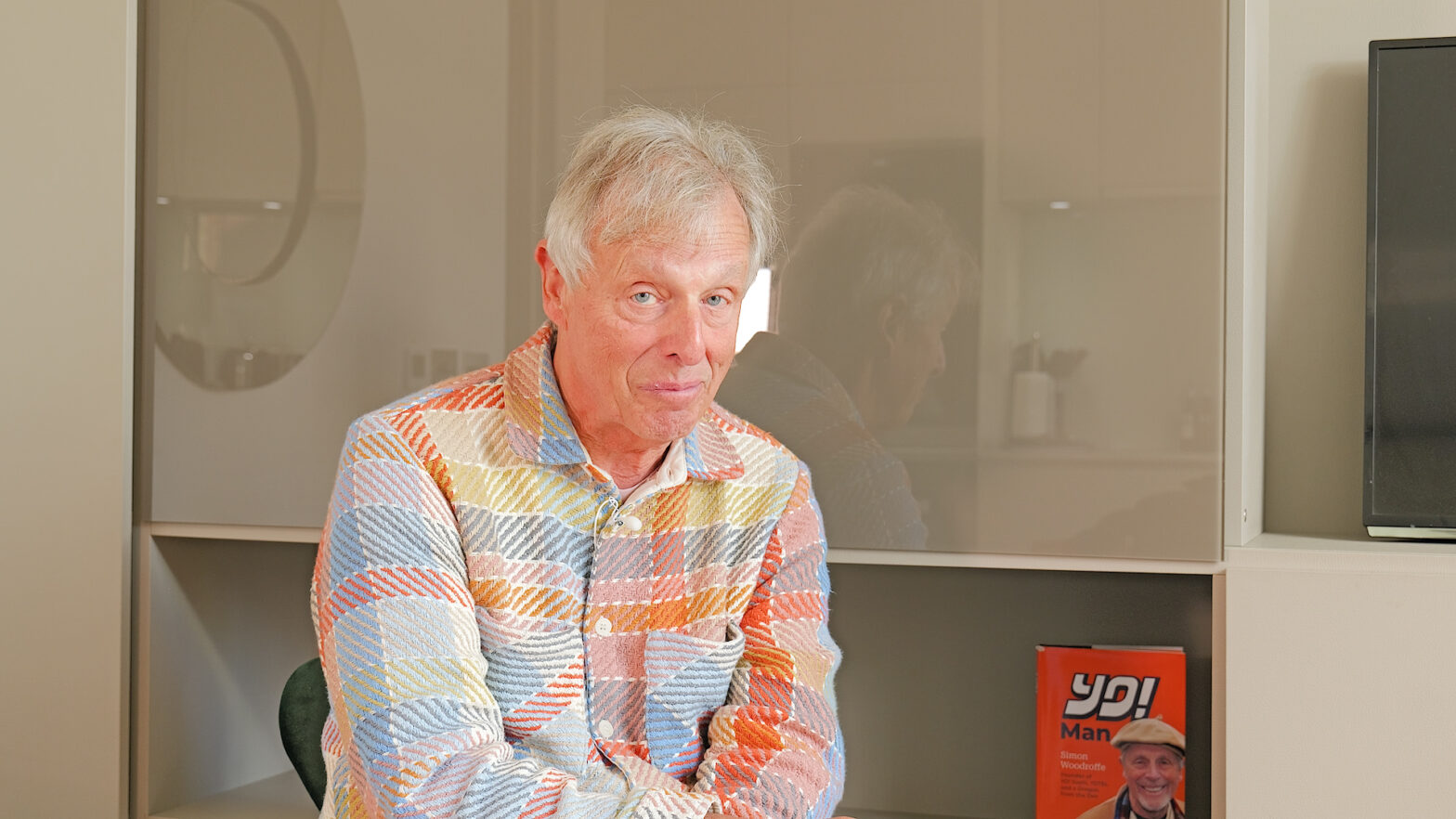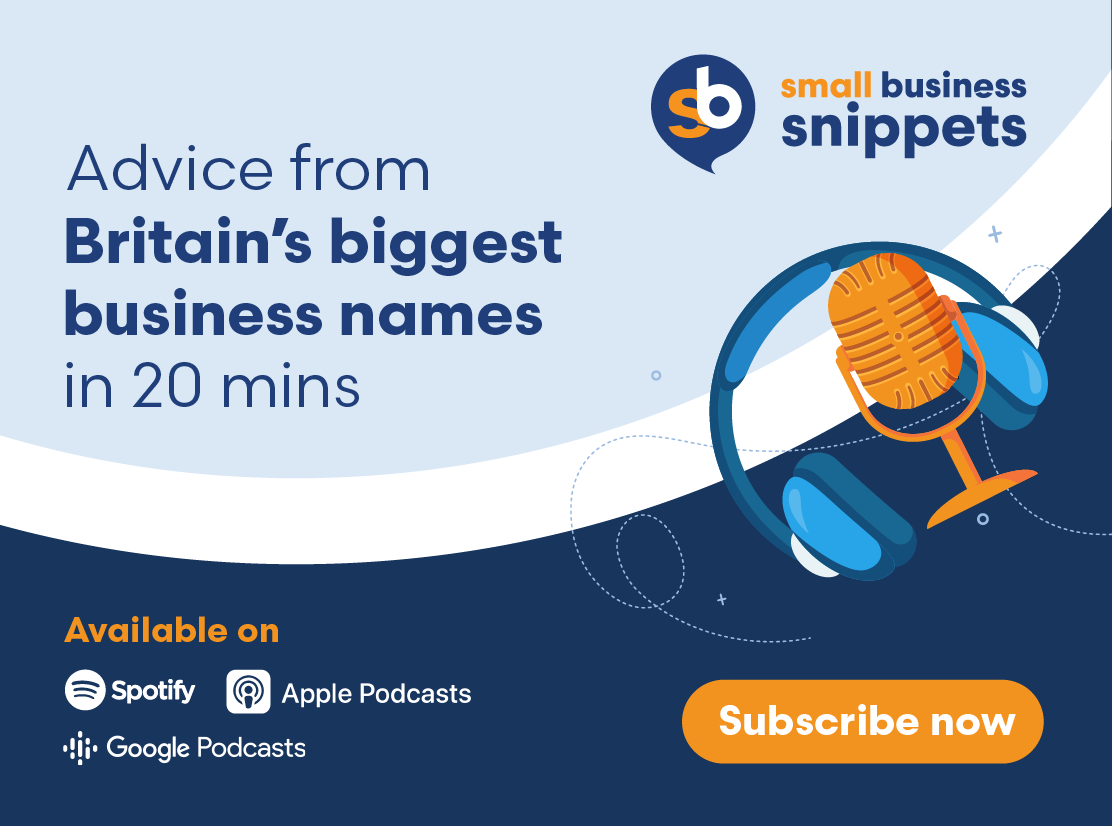Welcome to Small Business Snippets, the podcast from SmallBusiness.co.uk. Today’s guests are Myleene Klass and Jamie Barber, founders of My Supper Hero.
We discuss finding ethical suppliers, the challenges in setting up a subscription service and My Supper Hero tasting evenings.
Listen to it in the media player below.
You can watch a couple of teaser videos below.
You can also catch our episodes with:
- Pub owner and winner of The Great British Bake Off, Candice Brown
- Entrepreneur and former athlete, Sally Gunnell
- Entrepreneur and The Apprentice winner, Sian Gabbidon
- Abel & Cole founder and chairman of Freddie’s Flowers, Keith Abel
- Entrepreneur and The Apprentice 2019 winner, Carina Lepore
- Dragon Tej Lalvani and entrepreneur Sam Jones
- Angel investor, entrepreneur and TV personality, Spencer Matthews
- Entrepreneur and former Dragon on Dragon’s Den Ireland, Lady Chanelle McCoy
- Businessman and The Apprentice winner, Mark Wright
- Entrepreneur and campaigner, Paul Lindley
- Managing director of Brompton Bikes, Will Butler-Adams
- Businessman and author, Gerald Ratner
- Entrepreneur and TV presenter, Trinny Woodall
- Pub owner and bartender on Channel 4’s First Dates, Merlin Griffiths
- Founder and chairman of Pimlico (formerly Pimlico Plumbers), Charlie Mullins
- Retail expert and former Dragon, Theo Paphitis
- Author and boardroom expert, John Tusa
- Digital guru and investor, Sherry Coutu
- Entrepreneur and former Dragon, Rachel Elnaugh
- Businesswoman and Dragon, Deborah Meaden
- Entrepreneur and The Apprentice 2005 candidate, Tim Campbell
- Gousto CEO, Timo Boldt
- Entrepreneur and The Apprentice 2018 candidate, Jackie Fast
- Investor and former Dragon, Piers Linney
- Investment fund manager, Nicola Horlick
- Supermodel turned entrepreneur, Caprice
We’ve got podcast episodes from the first series looking at:
- How one business owner’s mental breakdown caused her to see trolls from her past
- How one entrepreneur hired a videographer to track their every move and build their business brand
- How funding a business led one entrepreneur to stress-related alopecia
- One entrepreneur’s first professional public speaking engagement
- Adapting to UK life and learning English before starting a business
- Securing seed funding
- Finding the perfect head of customer care
- Reaching a £1 million annual rate of return
- Boosting client numbers from 30 to 850
- Starting a brand new business from scratch
To find out more about Small Business Snippets, you can download the trailer.
If you want to listen to the podcast elsewhere, it’s available on Apple Podcasts, Google Podcasts and Spotify. Watch the new video versions and subscribe over at our YouTube channel. It’d also be great if you could leave us a review.
Remember to like us on Facebook @SmallBusinessExperts and follow us on Twitter @smallbusinessuk, all lower case.
Myleene Klass and Jamie Barber podcast transcript
Hello and welcome to Small Business Snippets, the podcast from SmallBusiness.co.uk. I’m your host, Anna Jordan.
Our guests are Myleene Klass and Jamie Barber. Klass is a TV and radio presenter, designer, classically trained musician and former member of pop group Hear’Say while Barber is a restaurateur and was an investor on BBC series Million Pound Menu.
Jamie and Myleene met at the school gates as their daughters were best friends. Fed up of lockdown cooking, the pair concocted a solution to home cooking fatigue and boring takeaways. My Supper Hero was founded in 2021, with delivered meals that are put together by a team of chefs with less than 10 minutes of prep time at home.
We’re going to be talking about finding ethical suppliers and just what it is that makes a food business great.
Anna: Hello, guys, how are you doing?
Myleene and Jamie: Well, thank you. Great.
Anna: Thank you so much for coming on the podcast.
So I’m just going to get straight in, you know, food prep for food delivery services is becoming an increasingly crowded market. What sets My Supper Hero apart from the likes of say, Gousto and HelloFresh?
Jamie: I’m not sure it is that crowded market in in what we’re trying to do, because I think that particularly over lockdown, Myleene and I were both in similar situations with our families and that we were kitchened-out. We’d had enough of the daily grind, of deciding what to cook, finding the ingredients cooking it, chopping it, peeling it. We were also I think quite takeawayed-out. I think there’s a limit to how many times a week certainly you can have fast food delivered to your home. All we wanted to do was to eat really, really brilliantly at home with very, very little. effort Then go and do other things with our lives that we wanted to do like watch Netflix or catch up with friends. Although one would think that that was a really crowded space, we couldn’t find that solution. We tried some of the basic recipe boxes, we found the amount of time to put those things together a lot longer than we were expecting and wanted, we were finding the recipes quite basic and we were searching for alternative. That’s how My Supper Hero came about, which was just a very strong focus on eating really well in a short amount of time. This is about high quality plus speed.
Myleene: Also, I think with those boxes and with the general market, the amount of packaging, I can’t believe it, it’s criminal. In this day and age, where we’re so aware now of what’s going on with our planet, I still cannot believe that there is no solution, until what we’re doing. We’ve got compostable boxes, we’re very, very aware of how we’re putting these boxes together and making sure that it’s as economical environmentally as possible, but also with just how we’re using our packaging. So that’s also a huge part of it for both of us.
Anna: So, there’s a lower volume of food or have components, perhaps low volume of components?
Myleene: Lower volume of components. But actually, for example, somebody saw our lettuce. We have the most beautiful hydroponic lettuces, they’re like little rosettes, and they come in these little boxes, little plastic packages, assuming it’s plastic packaging, actually, what you see that it’s plant-based, it’s compostable. So it shows it is possible because someone questioned when I was making a video about it. And I’m like, ‘No, no, no, no’. You know, I’m part of a family with five children, we do want to hand the planet over to our kids. I just think it’s really terrifying when many corporations still aren’t finding solutions to something as basic as that when people are really feeling right. We’re very passionate about it.
I think ultimately, you know what Jamie was talking about there as everybody’s got that sort of, I suppose what’s the equivalent of scrolling fatigue, but in the kitchen, you’ve only got a few recipes that everybody’s got up their sleeve before you’re like, what are we going to do now. And I’ve definitely I hit that mark by Thursday.
Anna: Beans on toast – always!
Myleene: There you go! You can still enjoy that, but at the same time, it’s nice to just have all the hassle taken away. Our line, which is I think my absolute mantra I live by, is ‘Less chopping, more chatting’. That is exactly where I am in the kitchen.
How did you go about finding this target market that you were looking for and who would want your products?
Myleene: Well, we are it. How many of your friends do you speak to and they’re like, ‘What are you making tonight? Oh, I got a box in.’ Then you just think, ‘Oh well how long is that going to take to chop and peel?’ You know it’s for us and I think that’s what’s so nice. We haven’t overthought it because I said to Jamie one day, ‘I just can’t think of anything to make now, and I just don’t want to spend hours making it, I just want to be with my family.’
Jamie: It’s funny, actually, because Myleene’s actually right because it wasn’t contrived. It was built very much for us. I mean, I’m a good cook and I cook quite a lot. But there are things that I just wouldn’t cook at home because it just takes too long. But we are kind of uncovering new audiences on a daily basis. So even yesterday, a guy called me and said that he started to spread the word to his friends and that they use Airbnbs quite a lot. And when you rent out of an Airbnb, what you don’t want to do is turn up there and have to cook. So, they’re ordering My Supper Heroes to their new destinations in advance so that when they arrive there, they’ve got something to cook in ten minutes. It’s not something I’ve even thought of before. And I think that people are kind of discovering it and using it in their own ways. That’s kind of part of the fun of it.
Myleene: I love that this is the audience, you can’t just decide who the audience is going to be. It’s ever evolving, because so much has changed now from the tech side of things to the prep side of things to what we want and how fast we want it and what we expect to get for our money.
I understand that you were going to go for a membership model where members get access to features and special menus or dishes that aren’t available to non-members, but then decided against it. For our listeners who are considering the membership model and the pros and the cons, could you walk us through a bit about that thought process and why you decided against it in the end?
Jamie: We didn’t decide against it. What happened is that we want in Supper Hero to be a regular part of our weekly meal cycle. Myleene, she’s slightly different actually. I think you would have it every day of the week if you had the opportunity to, but I think for most people, this is part of their weekly meal cycle. So, once a week, you get to eat fantastically well at home. I personally find this sort of subscription services where you’re tied into eating four or five meals a week from the same service. I find that quite stressful and a bit of a bind. It also takes up such a large amount of your week, that actually gives you the inability to try and choose whether you know, I can’t go out on Wednesday, because I’ve still got one meal leftover. I find that quite stressful. We wanted people to have it once a week, maybe, again on the weekend.
Originally, we started naively with a very soft, what we would call ‘subscription model’, but there’s no ties to it. However, I say naively, because we set out to do this, and thought that the technology to be able to do that would be really, really easy and found out that it was really, really difficult. Within literally three or four weeks of launching, we found that we were actually having to do most of the work manually and it was impossible. So we pulled that service until we built the technology to go back to a meal planning service. And that should hopefully, all things being equal, go live in about two-or-three-weeks’ time [at time of recording – 25 April 2022], having spent four months building the tech.
What kind of difficulties did you face?
Jamie: We originally thought that you could buy off the shelf, a subscription technology platform, and quickly found out that if you had a razor or a pen, and you were sending the same razor out or the same pen out on a regular basis, that is really, really easy. However, if you wanted to choose which meal you wanted, swap one meal for another, have varying prices, that was really, really difficult. There are much bigger companies that ask that have spent hundreds of thousands of pounds on developing that technology. But we’re a lean start-up. So we’ve had to do it in the kind of lean start-up way. We found some fantastic developers that we like to work with and we’ve been working with them for the last three or four months to build out this hopefully fantastic tech platform, which will be ready in a few weeks.
Actually, on that note, you say you’re trying to be lean, of course, as many start-ups are, especially for a food tech business. What tips do you have to try and keep costs down in the early days?
Jamie: I think there’s an old model, which is like you throw all of your costs into accelerating as quickly as possible and just blow a load of money very, very quickly. Actually, during this stage, we’ve really done very, very little marketing and very little outreach. Because we’ve been focused on the product, the most important thing is to make sure that those meals are brilliant. So, what we haven’t done is to go and suddenly take a big cheque and then spend it all on PPC adverts and Instagram ads and just trying to run before we can walk at this stage. It’s just about really making sure the product is incredible.
Myleene: You also want to understand who your customer is. I mean, I dare say that Jamie, deep dives so much into who is our customer, that you almost know them all on first-name basis, and what their orders are going to be, just a real understanding of who the customer is and what they want and how they’re using the service.
Also, if you talk about what the initial challenges were, it’s a good challenge to have, but we always said that we’re going to launch in the area that we both live in like, what, less than a mile away from each other. But then in order to really test what the product could do and send it out in the way that it was intended. We then had to try and grow as quickly as we could but then you have to try and make sure that you could insulate yourself towards those challenges. So suddenly, we’re going out to Wales and to Scotland and with that comes its own challenges.
It has to be obviously safe. It has to be carefully done. It has to taste as good as you say it’s going to taste and people are taking your word for it because until they’ve tasted it, they don’t know what they’re going to genuinely get.
I suppose knowing your customer helps you set the brand’s tone of voice from the off.
Myleene: I’ve really enjoyed that from the marketing side of things – finding what the handwriting is, finding what the photography was going to look like. I love the retro feel behind it. I love how beautiful and vibrant and classy and chic the website looks. I think that people do eat with their eyes. It’s the whole experience. It’s not just about trying to get someone to pop something into their basket, it’s ultimately about that the experience from start to finish. We wanted it from start to finish to be the eating experience.
This is my first experience of hydroponic lettuce in a farm that grows along a wall. How incredible is that? So again, it’s really sustainable. And it’s also done with optimum taste in mind. Everything that we say that our company stands for. So, I think that people don’t even necessarily know the ins and outs of it to that level. It’s ground-breaking.
Actually, I went to go and see the farm today, funnily enough, and it’s fantastic to look at – absolutely brilliant.
How do you make sure that your suppliers ethics match up with the ethics of your business?
Jamie: I’ve been in the restaurant business for 20 years. I’ve got quite a lot of knowledge about supply chain, and we’ve specifically chosen suppliers that match our values.
There used to be – I don’t know if that still exists – But there used to be a very good organisation called the Sustainable Restaurant Association, the SRA. And at one point, they did have a list of the suppliers that they endorsed or recommended. I don’t know if that’s still live. But on the Supper Hero website, I think under the frequently asked questions, there are quite a lot of details of our suppliers. So, people are always free to reach out to our suppliers and see if they can provide them with some business.
[The Sustainable Restaurant Association is still going – here are the links to the website and the list of sustainable suppliers – Ed.]
Coming back to food businesses. Jamie, you’ll be a one to ask on this. Some of our listeners will have, say, a café or something that they want to expand into maybe one or two more branches or maybe they want to go global. When you’re right at the beginning, how do you create a scalable food business?
Jamie: I think for the most part, people who have set out to make a business from scratch, that is scalable, have probably failed, because I think you’re thinking more about the economics rather than the product. When I did Million Pound Menu, one of the things that that was quite apparent is how people just love and engage with food all over the place, whether it’s quick service, snacks, grab-and-go fine dining, cooking at home. Whatever it is, people just love food, they love understanding food. At the end of the day, it’s the – I keep going on about it – but it is the product that is going to is that that is the tail that wags the dog, rather than vice versa, I don’t think that you can set out to create something that’s going to be a global, scalable business until you’ve really sussed out what your real core product and your core value is. And that’s where we are – we’re on the beginning of a journey.
Myleene, you said in the past that you don’t profess to be the best at anything, you’re just not frightened of anything, you just really go for it. So how have you taken that mindset and brought it into business?
Myleene: My background in business is very different to Jamie’s on the face of things, but actually, it’s the same, it’s customer service. Jamie’s absolutely right, it’s about making sure that the customer gets what they want, first and foremost. I provide that service, but ultimately, I’m also a customer.
I’ve had a baby brand in this country [My K], the longest-running baby brand, it’s coming up to 16 years. When you’re working with children, that’s something where you have to make sure that the safety elements and the requirements are second to none, they really have to be stringent.
It’s the same thing, I suppose, when it transfers over to food, you have to be really, really careful about what it is you’re putting together. You have to have an understanding of what it is the customer wants and expects. And whilst I don’t want to spend hours in the kitchen, I love my food. I love the presentation of it. I love what it brings together as Jamie was talking and you have said that it’s an, I suppose, essentially an oversubscribed market. But is it? Everyone still needs to eat.
Everybody’s looking for that new place to eat or that new experience and everyone wants to talk about this. Did you try this? Have you tried it with this? I made this the other night. So actually, it’s forever evolving. That’s the side of it that I really do enjoy. I love connecting with people, I still want to eat, I still want to make good food for my family and for my friends. I still want to make an event of it.
That’s why the combination of both myself and Jamie it’s been actually a really refreshing one and a really enjoyable one. I’ve learned so much from Jamie as we’ve been going along. At the same time, there’s so many things that are just massive similarities when it comes to business and it’s easy the products. I love going to the – why wouldn’t I? – the tasting evenings at Jamie’s house, which are just quite an event in their own right. I go with my Tupperware because I end up bringing so much of it home. I love that side of it too because it’s genuine. It’s, ‘Would I eat that with this? How would I eat this? Is this something that we would dive in with our hands? Is this something that the combination of these flavours is something that is familiar to a more general audience as opposed to us?’ It’s those conversations that I really do enjoy, that discovery.
Jamie: The lightbulb moment came for me when we were first talking about the idea for Supper Hero, one of one of my chefs I said to him look, what do you what do you cook at home? For your family know, when you’re in a restaurant, what do you cook? He said, ‘I might get a lamb shank from a local butcher. I’ll probably marinate it for 48 hours in lots of different Mediterranean-type ingredients like feta and apricot and olive oil. Then I might glaze it and have it just with some tzatziki made with some organic yoghurt and a flatbread, and I’ll just grab a piece of the flatbread and dip it. I said, ‘Can you can you do one of those? I want to get Myleene and see what she thinks.’ I call Myleene. I said, ‘Would you come over and try this?’ She came, and I said, ‘It’s lamb’ and she went, ‘I’m not really keen on lamb, just to let you know.’ Anyway, she finished the whole lot. Within five minutes, it was gone. People do like to be surprised!
Myleene: Yeah, it was a good surprise! I did come in with my judgment, I was really disappointed. Jamie’s quite right.
Anna: So it’s your strengths and weaknesses and your experiences that work together and how they can help you build from where you are.
Myleene: 100 per cent. There’s no point in both of us both doing the same job! So, we’ve got different experiences in different fields. But ultimately, we both care about the customer, we both want to be able to put our name to something that we feel very strongly about and very proud of. That’s why we’ve, as Jamie said, it’s starting small, but it’s very firm footsteps and it’s giving us a real understanding of what our customer wants, which again, is invaluable information. I think that’s something that, as you were talking before, it’s very easy to skirt over that looking as to what your eyes are on the prize – I suppose you have to figure out what the prize is first.
Jamie: It’s a much more enjoyable process, having a partner like Myleene, that we can just share feedback and spar a bit and just kind of just feed off each other’s energy. I really enjoy the journey with a partner rather than just doing it solo.
Myleene: But at the same time gives me Tupperware boxes of lamb to take home! We’ve got the toughest audiences. We’ve both got families, we’ve got kids. Those are the toughest audiences by comparison!
Anna: Oh yeah! Well, I think I’ll wrap up there. Thank you very much for coming on the podcast, guys. It’s been great.
Myleene and Jamie: That’s great. Pleasure. Thank you.
You can find out more about My Supper Hero at mysupperhero.com. You can also visit SmallBusiness.co.uk for more on starting a food-based business. Remember to like us @SmallBusinessExperts, follow us on Twitter @smallbusinessuk (all lowercase) and subscribe to our YouTube channel, linked in the description. Until next time, thank you for listening.
